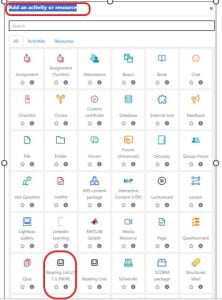The question we are asked most often by teaching staff is why not just use Moodle for providing links and pdfs to readings? Today’s case study shows one student’s experience of this.

Easy access for students?
A student contacted the library e-resources team as she had difficulty accessing an article online. Her Moodle course is well organised and gives key readings with some great context and reading notes. Several of the readings, however, led to an error page instead of the online article.
This is happening for two reasons. The URL for the reading was copied and pasted directly from the web address bar. For some resources, such as OVID, the web address contains session information or search terms: it is not a stable link. When re-visited later, the link no longer works.
A second problem is that even if a stable link is used, it does not include the information which prompts students to log in with their UCL details.
In the majority of cases, both these issues can be resolved by bookmarking from ReadingLists@UCL in the recommended way – using a bookmarking button, much like Pinterest or del.icio.us. When you first set up a list we will offer a quick orientation to show you how to do this.
For a handful of specialist databases, bookmarking requires an extra step. You can ‘Request review’ when your list is complete, and TLS will check and amend links for you; or ask TLS to create the bookmarks for you. For those who prefer to be self-sufficient we have some guides: in the tag cloud to the right, click on ‘Non-standard bookmarking‘.
How can this situation be avoided on your course?
- Set up an online reading list and have a brief orientation with TLS
- Switch on the ‘Library Resources’ block to make a stable link from Moodle to the online list
- Let your students know about the online reading list!
- Remove any articles from Moodle to avoid duplication of work, and confusion for students
 Close
Close












